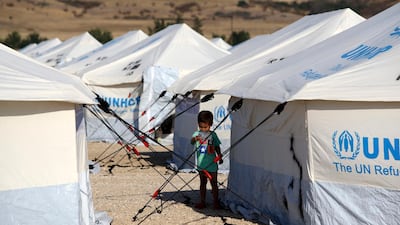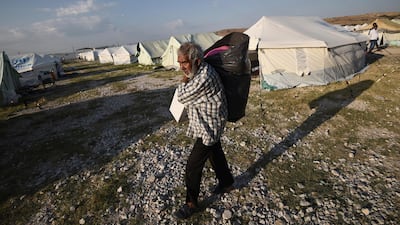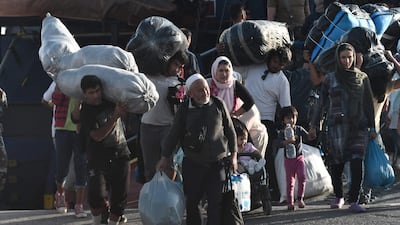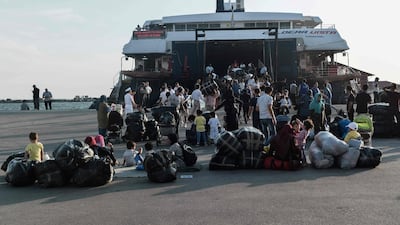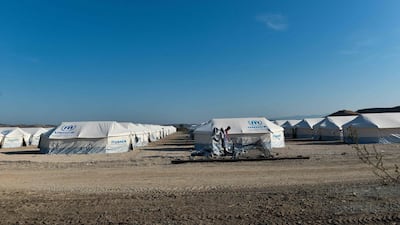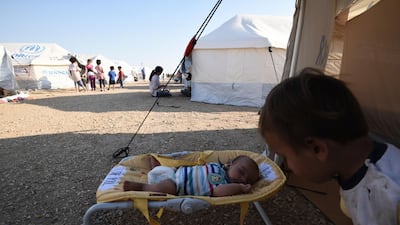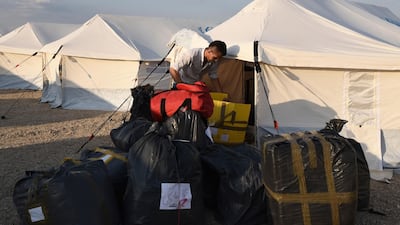It is about 9pm on August 29 and men, women and children lay scattered along the sides of the concrete path in the entrance to the Moria refugee camp on the Greek island of Lesbos.
There are more than usual because 13 boats carrying 546 people, half of them children, landed during the day.
They have the dubious honour of being the largest number of asylum seekers to arrive on the island in one day since 2015.
The new arrivals are forced to sleep outside with thin blankets for comfort and the few possessions they arrived with as they wait to be given tents.
This was not the refuge they envisioned when they risked their lives to sail there from Turkey.
Families usually spend a day or two living outside but single adults may have to wait several weeks here before being given a tent.
Moria houses about 10,000 people despite having an official capacity of only 3,000. And conditions will only get worse as as winter approaches.
The crisis is replicated throughout Greek islands in the North Aegean region, which received 225 boats carrying 8,000 refugees during August, said Norwegian charity Aegean Boat Report, which monitors arrivals.
The numbers could rise if Turkish President Recep Tayyip Erdogan carries out his recent threat to stop blocking refugees from leaving for Europe, going back on the March 2016 agreement with the EU that stemmed the tide of arrivals.
Turkey stopped 454 boats in August and arrested more than 14,000 people.
Greek Prime Minister Kyriakos Mitsotakis warned Mr Erdogan against using coercion to seek more assistance in hosting more than 3.5 million Syrian refugees.
"Europe has given a lot of money, €6 billion [Dh24.32 billion] in recent years, within the framework of an agreement between Europe and Turkey and which was mutually beneficial," Mr Mitsotakis said on Sunday.
His government is already taking steps to deal with the influx, announcing on September 1 that it would strengthen patrols of its maritime borders.
It also announced quicker transfers of asylum applicants from the islands to the mainland, and faster deportations of those ejected.
The next day 1,500 were moved from Lesbos to the mainland. But about 53 more boats have landed on the islands since then.
The plans have gathered a mixed response. While action is needed to address the huge number of migrants on the islands, there are fears it could lead to vulnerable people being sent back to life-threatening situations.
Len Meachim, a lay official at Lesbos's only Catholic church, said steps were needed to shorten the asylum application process, but he was concerned this approach might lead to “some injustices taking place”.
Mr Meachim's congregation is filled with members of different African communities at Mass every Sunday.
“Apart from the awful conditions of Moria, it’s the waiting and the not knowing what the answer will be that causes people a great deal of stress and anxiety,” he said.
“Equally, people need time to recover from the trauma they’ve suffered throughout their journeys and in the countries they’ve come from, while having the chance to put their case together.
“There is also the issue that the government is not providing enough accommodation on the mainland so there are people on the island who have had their travel restrictions lifted but they still have nowhere to go.”
Meanwhile, a spokesman from Pikpa Camp, an open camp for vulnerable refugees housing about 90 people on Lesbos, said he had concerns that in order to accelerate deportations, the authorities “are ready to violate some more rights of migrants”.
“In general, we will stand against any deportation as we believe in people's rights to movement," the spokesman said.
"As for the cases we know, we will make sure to protect them from arrest to avoid any risk of them being deported."
Katrin Brubakk is a trained clinical child psychologist but also works with adults in a mental health clinic run by Doctors without Borders (MSF) in Lesbos’s port town of Mytilene.
Ms Brubakk has been involved with the refugee operation since 2015 and said self-harm was a huge issue for residents in Moria.
“At the very beginning, the refugees were only here for a few days but after the implementation of the EU-Turkey deal in 2017, most stay here for long periods of time," she said.
"I’ve met people who’ve been in the camp for three years."
Ms Brubakk said many patients who visited the clinic were suicidal.
“People have lost hope," she said. "When you lose hope, you lose coping mechanisms. You fall apart and that’s when you get really sick.”
Tens of thousands of people have been stranded in Greece since the EU-Turkey deal and the closure of land borders in the Balkans.
Under the EU agreement, migrants arriving in Greece could be sent back to Turkey if they did not apply for asylum or their application was rejected.
Greece has repeatedly come under fire from international aid groups for not taking steps to improve the living conditions of its refugee camps.
Rasmeih, 48, from Syria, was among the arrivals on August 29 including her husband and four children aged between 9 and 17 – one of whom has autism.
Instead of spending a night in the transfer camp on the north of the island where they landed, the family were sent to Moria the same day because of the huge number of arrivals.
They were given a tent immediately but say they had not been given instructions about where to collect food and did not eat for almost 24 hours as a result.
Despite the conditions, which Rasmeih had no idea about before arriving, she said she was just relieved that her family were finally safe.
“My husband was a police officer in Aleppo but he ran away when he was told to kill people," she said.
"We moved to Turkey for a year but we moved back to Syria when people told us it was safe.
"We had a farm in Idlib but there were many air strikes and bombs, so my husband sold the land and we made our way here with that money because people told us we’d be safe.
“When I saw the Greek police, I wept with joy.”
Magalie, 19, is five months pregnant and used to be a teacher in the Democratic Republic of Congo.
She fled with her boyfriend to escape sexual abuse at the hands of a male relative but she is struggling to cope with her new reality since arriving in mid-August.
“I’m very scared about giving birth here and how I will raise a baby in conditions like this,” Magalie said.
